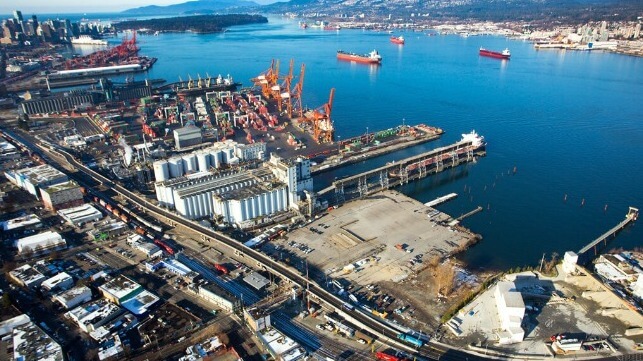Low Emission Technologies Tested at the Port of Vancouver

The Vancouver Fraser Port Authority, together with partners from across the port community, is testing various low- and zero-emission fuels and technologies at the Port of Vancouver as part of the port authority’s efforts to phase out all port-related emissions by 2050 in support of the Government of Canada’s goal to achieve net-zero emissions by 2050.
Through the Low-Emission Technology Initiative, a joint initiative between the port authority and the Province of British Columbia, the port authority and the province have each committed $1.5 million in funding to support the port community’s transition to low-emission energy. This includes testing battery-electric-powered terminal tractors; 100 percent biodiesel on commercial ferries; a hydrogen-powered crane; and 100 percent renewable diesel on a terminal locomotive and one of the port authority’s patrol boats.
“Charting our course towards a zero-emission port starts with collaborative efforts like these—between the port authority, the port community, and government—to test innovative new low-emission fuels and technologies that reduce emissions while keeping trade moving through the Port of Vancouver,” Robin Silvester, president, and chief executive officer of the Vancouver Fraser Port Authority, said. “We plan to continue taking tangible steps, in close collaboration with our partners across the port, towards our goal of phasing out all port-related emissions by 2050.”
Efforts to test low-emission fuels include a six-month trial of renewable diesel on one of the port authority’s patrol boats, the Takaya, making the port authority the first federal agency in Canada to run a vessel on 100 percent renewable diesel. Renewable diesel is a non-fossil fuel energy source derived from various organic sources such as vegetable oils, animal fats, and food waste. Using renewable diesel can result in up to 80% less net greenhouse gas emissions than regular diesel on a life-cycle basis. Shell Canada, a partner in this project, supplied the renewable diesel and provided significant technical expertise.
Viterra, which operates two grain terminals on the south shore of Burrard Inlet, recently began a 6-month trial of 100 percent renewable diesel on one of its locomotives at its Pacific Terminal. In addition, we continue to identify and implement viable ways to lower emissions in our operations,” Kyle Jeworski, CEO of Viterra Canada, said. “As a business with a global agriculture network, we recognize the need for collective action to achieve positive outcomes towards a sustainable future.”

that matters most
Get the latest maritime news delivered to your inbox daily.
DP World, which operates four container terminals across British Columbia, recently installed five zero-emission electric rail-mounted gantry cranes at its Centerm container terminal on the south shore of Burrard Inlet. In addition, the company is also in the final planning stages of retrofitting a hydrogen fuel cell-powered rubber-tired gantry crane. DP World also installed additional shore power technology, which now enables two container ships at a time to turn off their engines and plugs into hydroelectric power, reducing greenhouse gas emissions.
Seaspan Ferries, which operates a commercial ferry service between its terminals on Vancouver Island and the Lower Mainland, recently began running all six of its commercial ferries on 100 percent biodiesel following the success of a pilot project launched last.
